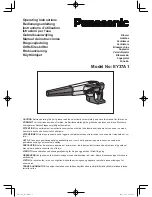
18
STORAGE
Immediately prepare your snow thrower for storage at the end of the season or if the unit will not be used for 30 days or more.
• Never use engine or carburetor cleaner prod ucts in the
fuel tank or permanent damage may occur.
• Use fresh fuel next season.
NOTE: Fuel stabilizer is an acceptable alternative in min-
i miz ing the formation of fuel gum deposits during stor age.
Add stabilizer to gasoline in fuel tank or storage container.
Always follow the mix ratio found on stabilizer container.
Run engine at least 10 min utes after adding stabilizer to
allow the stabilizer to reach the carburetor. Do not empty
the gas tank and carburetor if using fuel stabilizer.
ENGINE OIL
Drain oil (with engine warm) and replace with clean en-
gine oil. (See “ENGINE” in the Maintenance section of
this man ual).
CYLINDER
1. Remove spark plug.
2. Pour approximately one ounce (30 ml) of oil through
spark plug hole into cylinder.
3. Pull recoil starter handle slowly a few times to dis trib ute
oil.
4. Replace with new spark plug.
OTHER
• Do not store gasoline from one season to another.
• Replace your gasoline can if your can starts to rust.
Rust and/or dirt in your gasoline will cause problems.
• If possible, store your snow thrower indoors and cover
it to protect it from dust and dirt.
• Cover your snow thrower with a suitable pro tec tive cover
that does not retain moisture. Do not use plastic. Plastic
cannot breathe, which allows con den sa tion to form and
will cause your snow thrower to rust.
IMPORTANT: Never cover snow thrower while engine/
exhaust area is still warm.
NOTE: To seal punctures or prevent fl at tires due to slow
leaks, tire sealant may be purchased from your local parts
dealer. Tire sealant also prevents tire dry rot and cor ro sion.
ENGINE
CARBURETOR
Your carburetor is not adjustable. Engine performance
should not be affected at altitudes up to 2,134 meters. If
your engine does not operate properly due to suspected
carburetor problems, take your snow thrower to a qualifi ed
service centre/department.
ENGINE SPEED
Never tamper with the engine governor, which is factory set
for proper engine speed. Overspeeding the engine above
the factory high speed setting can be dangerous and will
void the warranty. If you think the engine-governed high
speed needs adjusting, contact a qualifi ed service centre/
department, which has the proper equipment and experi-
ence to make any necessary ad just ments.
TO REMOVE WHEELS (See Fig. 24)
• Remove the klik pin and remove wheel from axle.
IMPORTANT: When installing wheel, be sure to use the in-
nermost hole in axle and the wheel hub hole. To dis en gage
drive system from the wheels (for pushing or trans port ing
the snow thrower), remove klik pin from wheel hub and
insert pin into the outermost hole in axle only.
SERVICE AND ADJUSTMENTS
INNER
HOLE
KLIK PIN
OUTER HOLE
WHEEL HUB
WHEEL
FIG. 24
WARNING: Never store the snow
thrower with gaso line in the tank in side
a build ing where fumes may reach an
open fl ame, spark or pilot light as on a
fur nace, water heater, clothes dryer or
gas ap pli ance. Allow the engine to cool
be fore storing in any enclosure.
SNOW THROWER
When snow thrower is to be stored for a period of time,
clean it thor oughly, re move all dirt, grease, leaves, etc.
Store in a clean, dry area.
1. Clean entire snow thrower (See “CLEANING” in the
Main te nance section of this manual).
2. Inspect and replace belts, if necessary (See “TO RE-
PLACE BELTS” in the Service and Adjustments sec tion
of this manual).
3. Lubricate as shown in the Main te nance sec tion of this
man u al.
4. Be sure that all nuts, bolts, screws, and pins are securely
fas tened. Inspect moving parts for damage, breakage
and wear. Replace if nec es sary.
5. Touch up all rusted or chipped paint surfaces; sand
lightly before painting.
ENGINE
FUEL SYS TEM
IMPORTANT: It is important to prevent gum deposits
from forming in essential fuel system parts such as
carburetor, fuel hose, or tank during storage. Alcohol
blended fuels (called gasohol or using ethanol or metha-
nol) can attract moisture which leads to separation and
formation of acids during storage. Acidic gas can dam-
age the fuel system of an engine while in storage.
• Empty the fuel tank by starting the engine and letting
it run until the fuel lines and car bu re tor are empty.















































